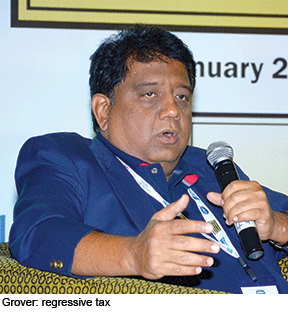Educationists in Mumbai — India’s commercial capital — are up in arms against a Central government July 11 notification which obliges private education providers to pay 12.36 percent service tax.
 In September 2013, the Congress-led UPA-II government at the Centre had exempted education institutions from paying service tax on all services to encourage the improvement and upgradation of schools and colleges. But in one of its first initiatives, the newly elected BJP-led NDA government, which swept to power last summer, has withdrawn the blanket exemption “provided to educational institutions by way of renting of immovable properties with immediate effect”.
In September 2013, the Congress-led UPA-II government at the Centre had exempted education institutions from paying service tax on all services to encourage the improvement and upgradation of schools and colleges. But in one of its first initiatives, the newly elected BJP-led NDA government, which swept to power last summer, has withdrawn the blanket exemption “provided to educational institutions by way of renting of immovable properties with immediate effect”.
That’s not all. Even all ‘auxiliary services’ excepting transportation of students, faculty and staff; catering, and the mid-day meals scheme; security and cleaning, house-keeping services; services relating to admissions and conduct of examinations, are subject to service tax.
The reimposition of service tax on education provision has hit education companies, firms, trusts and charities hard. Henceforth, private companies providing premises on rent and a range of services to schools may have to absorb all service taxes except for auxiliary services exempted in the July 11 notification. Often promoted by trustees of education institutions themselves to get around case law forbidding education institutions resorting to “commercialisation of education” and rewarding investors, education management companies are likely to suffer a sharp drop in profitability.
“Taxation of any service provided to education is regressive because it’s a disincentive to improving the quality of education provided to students. Normatively, all indirect taxes are passed on to the consumer. But passing on the punitive 12.36 percent service tax to parents/students is expressly prohibited by the notification. Combined with a pending Bill to cap tuition fees in private schools in Maharashtra, and the obligation imposed upon private school managements to admit poor neighbourhood children at government mandated tuition fees by the RTE Act, the service tax imposition will certainly squeeze education providers and school managements,” says Raj Grover, chief mentor of Kangaroo Kids Education Ltd, a company which manages the operations of over 100 pre-primary and primary-secondary schools in India and abroad.
Indeed, the intent of the Central government seems to be to discourage investment in private education. With government schools and education institutions unable to improve teaching-learning standards and people in all strata of society migrating to private schools and colleges, the tax on education services is anti-social.
Insightful monitors of India’s crumbling education system discern a clear design in the additional obligations being imposed upon private education providers countrywide, of which service tax is the latest example. “Unable to raise standards and learning outcomes in the country’s 1.2 million government schools, politicians and bureaucrats at the Centre and in the states are determined to drag 200,000 private schools down and/or prevent their expansion. This is the only way to stem the continuous exodus of children out of public education. Hence, the RTE Act obligations, service tax imposition, cap of private school fees, increased inspections, etc,” says a Mumbai-based educationist, not without a trace of bitterness.
The gap between prime minister Narendra Modi’s skill, scale and speed rhetoric and Union finance minister Arun Jaitley’s lack of compunction in targeting the country’s crumbling education system for resource mobilisation is beginning to show.
Indrajit Dutta (Mumbai)


























